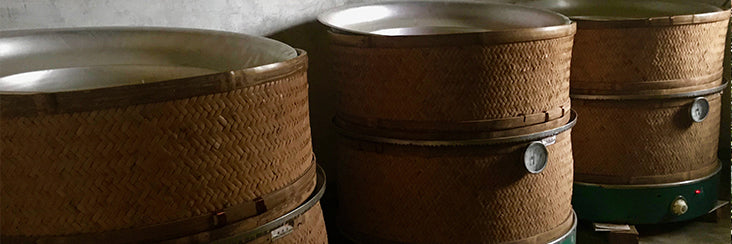
The World's Largest Oolong Tea Competition
Andy recently visited a good friend and long-time Oolong tea supplier in Lugu. It so happened, the Lugu Farmers' Association's Dong Ding Oolong Competition was kicking off at the same time. This competition is the largest Oolong tea competition in the world and tea farmers far and wide bring their best teas for judging. Andy used this opportunity to bring you a behind-the-scenes peek into how a good loose leaf oolong tea is crowned a winner.

Traditional Tea Making
Shown above are bamboo basket roasters in full effect, emitting exquisite aromas of tea leaves in their last hours of roasting in preparation for the Lugu Farmers' Association's Dong Ding Oolong Tea Competition — winter 2017. These traditional style roasters are often used for the final roasting, following repeated roastings in larger convection ovens. The temperature for roasting ranges from about 80°C to 120°C from beginning to end for a total of 25 to 40 hours, typically involving 6-8 hour sessions with days of "rest" between roastings.

Master Oolong Tea Maker
And this is Mr. Su, who I visited in his workshop while he was tasting the batches of tea that would be delivered to the Farmers' Association the next day for the winter tea competition. Personally, this is my favorite and most meaningful setting of the world's largest Oolong Tea competition. A spontaneous visit with an elder traditional tea maker who pioneered Taiwan's modern tea industry, with some 60 years of professional tea production behind him, and still winning the highest awards. Earlier, we reported on how Mr. Su and other elder tea artisans were helping to keep the traditional Dong Ding Oolong tea making tradition alive. Being there, tasting his tea along with him at the culmination of his weeks of work, chatting freely about everything from this season's harvest to the history of the competition from its beginning — this is the heart of it.

Line-up to Submit Tea
The next day, I stopped by the Lugu Farmers' Association to see who I might meet as they entered their batches of tea into the winter tea competition. I happened to arrive around lunch time, at a lull in the two-day hustle and bustle of over 6700 entries to be submitted. I saw a couple local friends waiting in line to enter their family's batches of tea, after months of tea growing, harvesting, processing, and post production roasting. There is a subtle intensity to the friendly, easy-going — yet extensive process of registering, repackaging and coding each batch of tea.

Traditional Handling
I happily took note of the fact that the people I knew who were waiting in line had prepared their batches of tea in a way that represented a more traditional approach, simply by the fact that their tea was in hand-tied, unsealed bags. This is done with a purpose — to allow the leaves to continue to "breathe and settle" into their final composition. Each batch of tea that is submitted must be removed from its original packaging, weighed, and and repackaged using coded registration numbers. So the people waiting in line with dozens of entries have been preparing for months, sometimes using batches of tea from other seasonal harvests and regions. This is why I especially like seeing local residents lined up with their hand-tied batches.

Cupping and Judging
And for the following week, the preliminary cupping and judging takes place. This extensive process involving six teams of six judges each taste all of the competition entries. In the process, all of the entries are given given a preliminary rating. The preliminary judges are all residents of Lugu Township, and almost of them are tea farmers and tea artisans. After this, another week of tasting and judging is done by nationally certified professional judges to designate the higher ranking awards.

Even this simplified overview of the Lugu Farmers' Association's Dong Ding Oolong Competition allows us to acknowledge the expanse of resources that are involved in its production. This competition is a leading model, both domestically and internationally, for maximizing the quality and value of a traditional product of regional origin — in this case, Dong Ding Oolong Tea!

Sign Up for our Newsletter!
If you like this story, sign up for our newsletter! We regularly share information, discounts, promotions, and stories like this through our newsletter. Sign up now and get $5 off your first order! And be sure to follow us on Facebook and Instagram!

